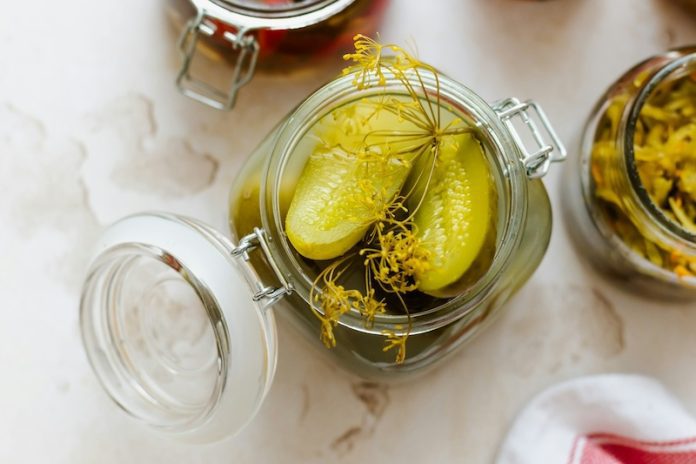
Pickle juice, the briny solution left over after cucumbers are pickled in a mixture of vinegar, salt, and seasonings, might seem like something you’d pour down the drain.
But before you do, you might be surprised to learn that this tangy liquid is packed with benefits and has gained attention not just among food enthusiasts, but also athletes and health-conscious individuals.
The background of pickle juice is as simple as it sounds.
Traditionally used to preserve and add flavor to cucumbers, the juice is a mixture of water, vinegar, salt, and various spices. It is this combination that contributes to its unique properties and potential health benefits.
One of the most talked-about uses of pickle juice is for hydration and recovery in sports. Athletes, especially those who engage in long and strenuous activities, sometimes drink pickle juice to help replenish electrolytes.
The high sodium content, along with potassium and magnesium found in the juice, makes it effective for rehydrating and preventing muscle cramps.
Studies have shown that drinking small amounts of pickle juice can relieve muscle cramps faster than drinking the same amount of water. This is thought to be due to the vinegar content, which may help to stop nerve signals that cause tired muscles to cramp.
Besides aiding in hydration, pickle juice has other health benefits. It’s surprisingly rich in antioxidants, thanks to the vinegar and cucumber essence. Antioxidants help fight free radicals, molecules that can cause harm if their levels become too high in your body.
Regularly consuming foods and drinks high in antioxidants can improve your overall health and reduce the risk of chronic diseases.
Pickle juice also has a unique appeal for those looking to manage their blood sugar levels. Vinegar, a major component of pickle juice, is known to have anti-glycemic properties. This means it can help lower blood sugar levels following a meal by slowing the absorption of carbohydrates and increasing insulin sensitivity.
For people with type 2 diabetes or those trying to manage their weight, incorporating small amounts of pickle juice could be beneficial.
Moreover, the acidic nature of pickle juice makes it a natural remedy for soothing sore throats and killing harmful bacteria in the mouth. It’s often used as a folk remedy for colds and sore throats, with many swearing by its effectiveness for easing discomfort and reducing bacteria.
Pickle juice is also being explored for its potential benefits in supporting digestive health. The vinegar in pickle juice can help increase stomach acidity, which can lead to better digestion and absorption of nutrients.
Some people use it as a natural remedy for heartburn and acid reflux, although it’s worth noting that for others, the acidity might exacerbate these conditions.
However, it’s important to consume pickle juice in moderation. Its high sodium content can be a concern for people with high blood pressure or those on sodium-restricted diets. Additionally, the acidity of vinegar-based pickle juice can cause tooth enamel erosion if consumed excessively.
In conclusion, pickle juice is more than just a by-product of pickling cucumbers. Its unique properties can offer a range of health benefits from hydration and muscle cramp relief to antioxidant effects and blood sugar control.
However, as with any remedy, whether natural or not, it should be used sensibly and in moderation to avoid potential downsides. Next time you finish a jar of pickles, think twice before discarding that liquid gold at the bottom—it might just be the health boost you didn’t know you were missing.
Follow us on Twitter for more articles about this topic.
Copyright © 2024 Scientific Diet. All rights reserved.





